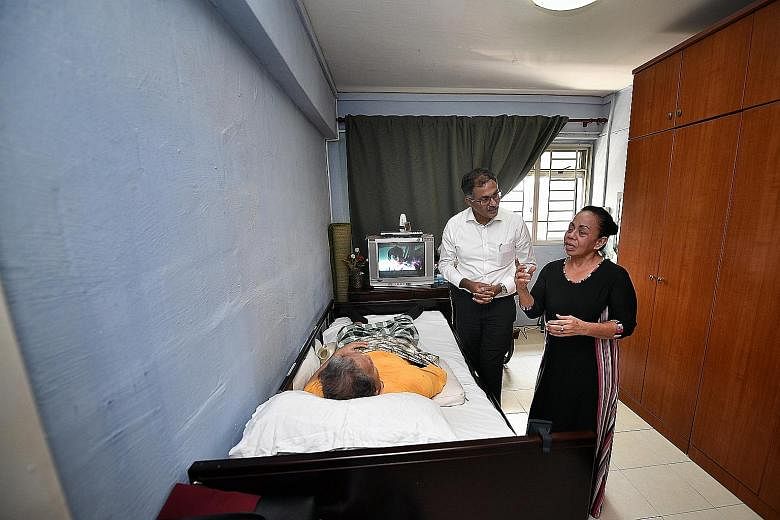Standing 1.4m tall and weighing 55kg, Madam Salmah Awang Chik, 63, struggled to turn her bedridden husband three or four times a day to keep bedsores away.
A hospital bed would have helped but it was too costly, and she never gave it a thought until she met Mr Murali Pillai, MP for Bukit Batok.
Seeking welfare aid and food vouchers, she explained to Mr Murali her daily toil and why she could not work. She was a former cleaner.
As Mr Murali, 49, listened, he wondered: "How has this petite woman single-handedly cared for her husband over the last 13 years?"
The encounter last December was to inspire yet another programme for those in need in his single-seat constituency - providing hospital beds for the infirm and elderly.
It was not on his list of campaign promises a year ago, when he defeated Singapore Democratic Party chief Chee Soon Juan in a May 7 by-election, winning 61.2 per cent of the vote.
His PAP predecessor, Mr David Ong, had resigned in March last year over an extra-marital affair.
Today, Mr Murali's report card shows he has turned his promises into programmes - and then some.
His election manifesto had focused on three areas: bringing more jobs to his constituents, helping the disproportionate number of elderly in his constituency and promoting social mobility.
Initiatives in all three areas are up and running.
A job placement programme links Bukit Batok businessmen with residents seeking jobs, such as restaurant waiters and security guards.
"The good thing about our programme is that we have a fast turnaround. We can place job seekers near their homes in a matter of weeks," Mr Murali said in an interview with The Sunday Times, taking stock of his one year as an MP.
For those who need them, especially the elderly sick, a local medical supply company and a healthcare cooperative offer discounts of up to 30 per cent for medical necessities, such as adult diapers, catheters and urine bags.
At-risk youth are put in the hands of voluntary welfare organisation Touch Community Services, which currently mentors and gives tuition to about 100 students.
"Single-parent families, especially, need a bit more help with their children," Mr Murali said.
"Tuition, however, is one part of the equation; the other is giving the kids the chance to build their confidence to deal with life's challenges."
But even as one ticks off the campaign promises kept, Mr Pillai is quick to add: "It's not about going through laundry list of things. The manifesto is only a starting point.
"We need to carefully gauge and address our residents' needs, which can change over time."
The hospital-bed programme is one example. It started in January with 10 beds and, already, another 10 are in the pipeline to meet the demand.
Mr Pillai declined to disclose the cost of each, saying they are sponsored by grassroots leaders and business owners. But an online check shows retailers selling them for between $1,000 and $3,000.
Madam Salmah said the hospital bed makes it "so much easier" to feed and clean her husband, 64, who had a stroke.
Mr Murali hosts breakfast dialogues at various void decks every Saturday, for those among the 27,000 residents who do not regularly come for weekly Meet- the-People Sessions, to listen to their concerns and update them on policies that would benefit them.
Their needs have turned out to be highly challenging, prompting him to set up nine task forces to better address specific concerns.
The Build-To-Order task force, for instance, helps families moving into new HDB flats in the constituency to investigate complaints and liaise directly with government agencies on the problems they face.
What comes most naturally to Mr Murali, a commercial litigation lawyer and partner at Rajah & Tann, is parliamentary work.
"My skillset as a lawyer helps me to analyse a Bill, look at the policy underpinnings and juxtapose them against the legal language used, and to point out gaps, if there are any."
There is a temptation to call him Mr Fix-It or Mr Social Worker, but residents prefer the endearing nickname Ah Mu.
This is especially so among the many older Chinese residents.
Initially, they feared he would not understand their problems as he does not speak Chinese.
But Mr Murali, who speaks English, Malay, Tamil and some Mandarin and Hokkien, appears to have gained their trust and endeared himself to them.
The exuberance with which hairdresser Cheng Peck Keow, 63, greeted him recently seems typical. "Ah Mu," Madam Cheng called out in Mandarin. "So good to see you! You're my lucky Buddha."
Madam Cheng, a long-time resident, said of her MP: "We've nothing to complain about. But if we do, we know Ah Mu will fix it."
Like the national leaders, Mr Murali said leadership renewal is often on his mind since becoming an MP, though on a smaller scale confined to just his constituency.
"I spend a lot of time looking for community leaders who can ensure continuity in the work we do for our residents," he said. About 20 young people have approached him in recent months to be volunteers.
Noting that Bukit Batok is a mature estate that has benefited from the "toil and care of past and present community leaders", he said: "I owe it to them to identify people to carry on the good work that was started way before me."


